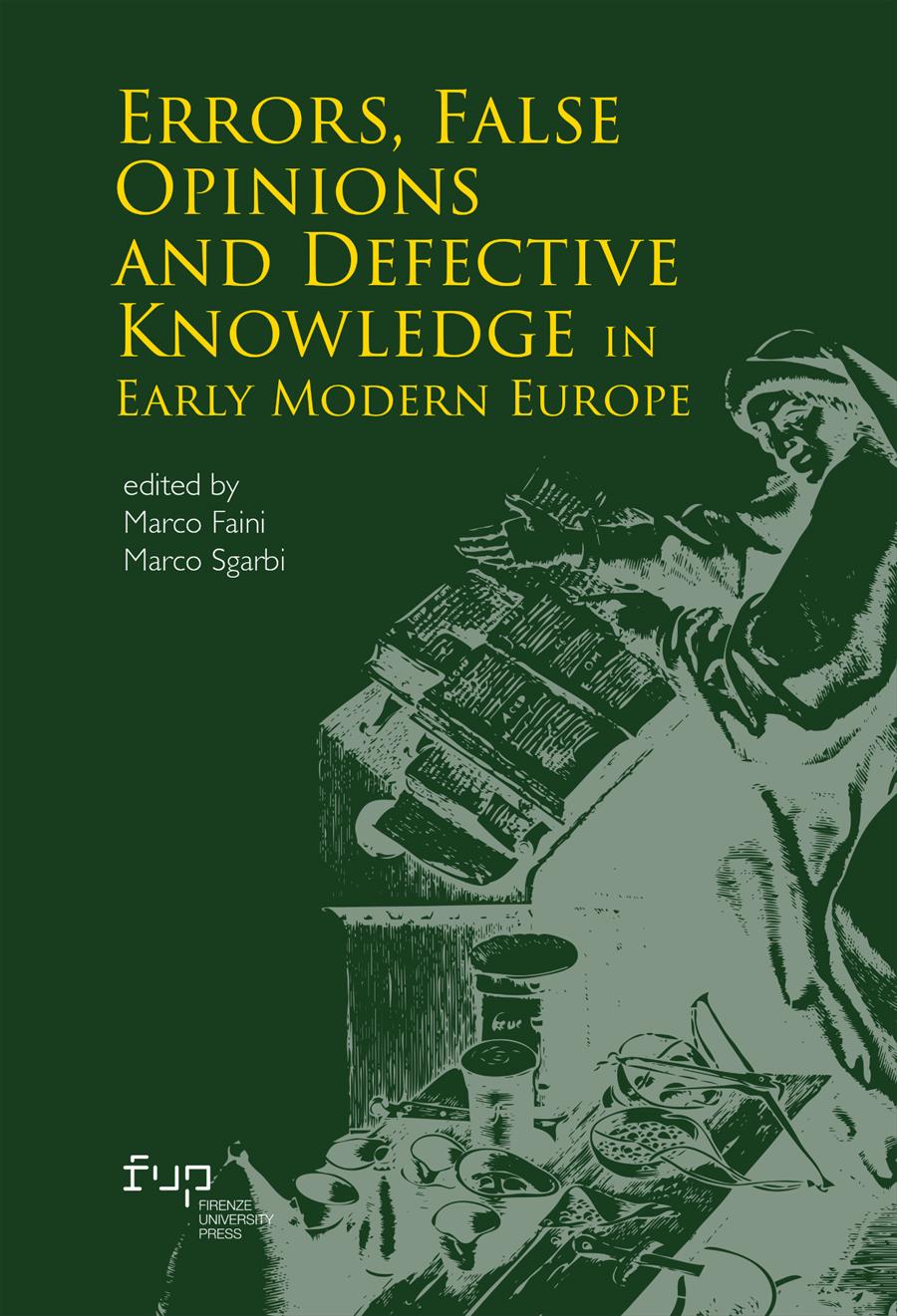- Errors, False Opinions and Defective Knowledge in Early Modern Europe
- Marco Faini, Marco Sgarbi
“Errori popolari:” How a Medical Notion Became an Aesthetic One
- Paolo Cherchi
- © 2023 Author(s) |
- CC BY 4.0
- DOI: 10.36253/979-12-215-0266-4.05
The notion and the linguistic coinage of “errore popolare” is not as old as it is commonly believed, but comes from the history of medicine when in the late 16th Century, the Sorbonne’s professors labelled as “erreur populaire” the paracelsian therapies. The definition became common in Italy and England. Another area where the idea of “errore popolare” was widespread is that of religion, where the notion of “error” borders with that of heresy, superstition and magic. However, the “scientific revolution” did not identify the mistakes with a social class or discipline but in the way knowledge was acquired: only the criteria of proof and evidence dispelled erroneous notions. Thus the “scientific knowledge” discredited the beliefs of the ancients, considered to be their major source, and confined them the sphere of imagination which was to be highly appreciated in the Romantic age. Such a change in perception and evaluation was favored by the new vision of the popular culture, folklore, seen as an autonomous cultural system.
- Keywords:
- vulgus,
- paracelsian medicine,
- ciarlatani,
- secrets,
- popular errors,
University of Chicago, United States
- Aldana, Cosimo. 1578. Discorso contro il volgo in cui con buone ragioni si riprovano molte sue false opinioni. Firenze: Marescotti.
- Aldana, Cosimo. 1591. Invectiva contra el vulgo. Madrid: Luis Sanchez.
- Aldana, Cosimo. 1886. Invectiva contra el vulgo. In Biblioteca de Autores Españoles, vol. XXXVI, 495-514. Madrid: Ribadeneyra.
- Bacon, Francis. 1878. Novum Organum scientiarum, ed. Thomas Fowler. Oxford: Clarendon.
- Benigno, Francesco. 2013. “Cultura popolare.” In Parole nel tempo. Il lessico per pensare la storia, 79-114. Rome: Viella.
- Bianchi, Massimo Luigi. 1987. Signatura rerum. Segni, magia e conoscenza da Paracelso a Leibniz. Rome: Edizioni dell’Ateneo.
- Bianchi, Massimo Luigi. 1995. Introduzione a Paracelso. Bari: Laterza.
- Cherchi, Paolo. 2020. Ignoranza ed erudizione. L’Italia dei dogmi di fronte all’Europa scettica e critica (1500-1750). Padua: Libreriauniversitaria.it.
- Coste, Joël. 2002. La littérature des “erreurs populaires:” une ethnographie médicale à l’époque modern. Paris: Champion.
- Debus, Allen George. 1991. The French Paracelsians, The Chemical Challenge to Medical and Scientific Tradition in Early Modern France. Cambridge: Cambridge University Press.
- Du Breil, André. 1580. La police de l’art et science de medicine, contenant la refutation des erreurs, et insignes abuse qui s’y commettent pour le jourdhuy: tres – utile et necessaire a toute personnes, qui ont leur santé et vie en recommendation. Ou son
- d’Espagne, Jean. 1649. Les erreurs populaires dans les poincts generaux: qui concernent l’intelligence de la religion; rapportez à leurs causes, & compris en diverses observations. Le Haye: Maistre.
- Eamon, William. 1996. Science and the Secrets of Nature: Books of Secrets in Medieval and Early Modern Culture. Princeton: Princeton University Press.
- Gadebusch Bondio, Mariacarla. 2003. “Paracelsismus, Astrologie und ärtztliches Ethos in den Streitschriften von Tommaso Bovio (1521-1609).” Medizin Historisches Journal, 38: 215-44.
- Galilei, Galileo. 1874. Dialogo dei massimi sistemi. Livorno: Vigo.
- Gentilcore, David. 2006. Medical Charlatanism in Early Modern Italy. Oxford: Oxford University Press.
- Grmek, Mirko D. (Ed.). 1997. Histoire de la pensée médicale en Occident (History of Medical Thought in the West), 3 vols., 1995-1999. Vol. 2., De la Renaissance aux Lumières. Paris: Seuil.
- Ingegno, Alfonso. 1983. “Il Medico de’ disperati e abbandonati: Tomaso Zefiriele Bovio (1521–1609) tra Paracelso e l’alchimia del Seicento.” In Cultura popolare e cultura dotta nel Seicento, ed. Lucilla Borselli, Giancarlo Carabelli, Chiaretta Poli, Paolo
- Joubert, Laurent. 1578. Erreurs populaires au fait de la medicine et regime de santé. Bordeaux: Millanges.
- Kahn, Didier. 1998. “La faculté de medicine de Paris en échec face au paracelsisme: enjeux et dénuement reel du procès de Roche Le Bailiff.” In Paracelsus und seine internationale Rezeption in der Frühen Neuzeit,- Beiträge zur Geschichte des Paracelsismus
- Leopardi, Giacomo. 1997. Sopra gli errori popolari degli antichi, ed. Giovanni Battista Bronzini. Venosa: Edizioni Osanna.
- Lequinio, Joseph-Maria. 1793. Le préjugés détruits, séconde edition. Paris: s.e.
- Meier, Pirmin. 2000. Paracelso, medico e profeta. Roma: Salerno.
- Mercurii, Scipione. 1645. Degli errori popolari d’Italia. Verona: Rossi.
- Miotto, Antonio. 1971. Paracelso, medico e mago. Milano: Ferro.
- Nockels Fabbri, Christiane. 2007. “Treating Medieval Plague: The Wonderful Virtues of Theriac.” Early Science and Medicine, 12: 247-83.
- Nutton, Vivian. 1997. “The Rise of Medical Humanism: Ferrara, 1464-1555.” Renaissance Studies, 11: 2-19.
- Pagel, Walter. 1989. Paracelso. Un’introduzione alla medicina filosofica nell’età del Rinascimento. Milano: Mondadori.
- Redi, Francesco. 1810. Esperienze intorno alla generazione degl’insetti. In Opere, vol. III. Milan: Società de’ Classici Italiani.
- Riva, Ernesto. 2018. Astrologia e magia nella medicina dei secoli XV e XVI. Rome: Aracne.
- Salinas Araya, Augusto. 2016. “Tradición e innovación en la medicina española del renacimiento.” Ars médica. Revista de ciencias médicas, 30: 14-53.
- Stahl, Eva. 1995. Paracelso, medico, filosofo, mago. Genova: ecig.
- Vannoni, Maria Pia. 2011. “Il ‘medico della spada:’ Tomaso Zefiriele Bovio.” Bruniana & Campanelliana, 17: 81-96.
- Vico, Giambattista. 1952. Scienza nuova, ed. Nicola Abbagnano. Turin: U.T.E.T.
- Webster, Charles. 1984. Magia e scienza da Paracelso a Newton. Bologna: Il Mulino.
Chapter Information
Chapter Title
“Errori popolari:” How a Medical Notion Became an Aesthetic One
Authors
Paolo Cherchi
Language
English
DOI
10.36253/979-12-215-0266-4.05
Peer Reviewed
Publication Year
2023
Copyright Information
© 2023 Author(s)
Content License
Metadata License
Bibliographic Information
Book Title
Errors, False Opinions and Defective Knowledge in Early Modern Europe
Authors
Marco Faini, Marco Sgarbi
Peer Reviewed
Number of Pages
145
Publication Year
2023
Copyright Information
© 2023 Author(s)
Content License
Metadata License
Publisher Name
Firenze University Press
DOI
10.36253/979-12-215-0266-4
ISBN Print
979-12-215-0265-7
eISBN (pdf)
979-12-215-0266-4
eISBN (epub)
979-12-215-0267-1
Series Title
Knowledge and its Histories
Series ISSN
3035-5974
Series E-ISSN
3035-5923
